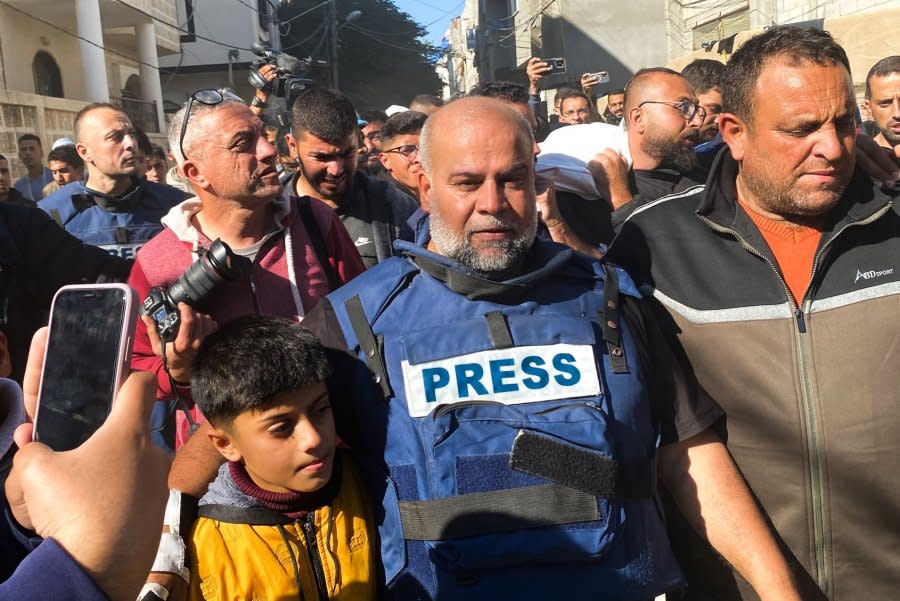Israel surges to 6th place on list of nations with jailed journalists in 2023

Jan. 19 (UPI) -- Israel has emerged as one of the world's leading jailers of journalists amid the Israel-Hamas war, sharing sixth place with Iran on a list of the most restrictive states on press freedoms, according to a global analysis by a non-profit dedicated to preserving media access.
The 2023 prison census report, published Thursday by the New York-based Committee to Protect Journalists, identified China, Myanmar, Belarus, Russia, and Vietnam as the top five places where journalists are currently incarcerated.
Israel's inclusion in the annual report is not new, but the data indicated a significant increase in arrests of Palestinian journalists in recent months, with its highest ranking to date.
Overall, Israel has detained more than 20 journalists since the war began, but those released before Dec. 1 or held since are not included in the 2023 census, the report said.
Most in Israeli custody are being held in administrative detention, allowing authorities to keep them jailed without formal charges based on mere suspicion that they would commit a future crime.
The legal proceedings are often closed off from public view, making it harder to assess the validity of charges and whether there is due process.
The report breaks down a tally for each nation where hundreds of journalists are languishing in prison for nothing more than doing their jobs, including 44 in China, 43 in Myanmar, and 28 in Belarus, which accounted for 35.8% of incarcerated journalists.
According to the report, the Israeli government is currently holding 17 journalists, a number that was on par with Iran's oppressive regime.
Notably, Iran's position represented a sharp decline from its standing in 2022, when protests gripped the country following the death of Mahsa Amini, the 22-year-old Kurdish woman who died in Iranian police custody after her arrest for not wearing her hijab properly.
Of the 17 journalists currently jailed in Iran, eight are women, including two female journalists who reported on Amini's death in September 2022, according to the report.
In December, CPJ estimated 320 journalists were imprisoned worldwide, marking the second-highest number jailed since record-keeping began in 1992.
The CPJ investigation reveals that 168 of those currently jailed face bogus charges related to fake news and anti-state activities, including terrorism, as government figures increasingly retaliate against critical media coverage.
In 66 ongoing cases, detained journalists are kept in the dark about the charges they face while being forced to endure harsh conditions as authorities extend pre-trial detention, impeding the efforts of defense attorneys, the report said.
The report also highlighted a growing trend among authoritarian regimes who were taking more extreme measures to silence dissent beyond their borders -- as demonstrated by arrest warrants from Moscow for Russian journalists living abroad, and Ethiopia's extradition of an exiled journalist on terrorism charges after he was arrested in Djibouti.
China has a history of suppressing journalists, making it hard to pinpoint the exact number of imprisoned due to censorship, the report notes.
In recent years, Beijing's crackdown on the media has intensified, the report said.
In 2021, for the first time, journalists from Hong Kong were jailed amid the annual prison census by CPJ following Beijing's passage of a strict national security law amid angry pro-democracy protests.
Beijing is increasingly using anti-state charges to detain journalists on charges of espionage, separatism, or undermining the government. A significant number of those facing charges are ethnic minorities from Xinjiang known as the Uighurs, including 19 journalists detained in 2023.
The report cites many other oppressive measures being used to tamp down dissent, including cruelty and retaliation, exposure to physical and sexual abuse, denial of medical treatment and basic necessities, and travel restrictions.
The report also cited imprisoned journalists in Afghanistan, Algeria, Angola, Azerbaijan, Bahrain, Burundi, Cuba, the Democratic Republic of Congo, Egypt, El Salvador, Guatemala, Honduras, India, Iraq, Madagascar, Morocco, Nicaragua, Nigeria, the Philippines, Saudi Arabia, Senegal, Syria, Tunisia, Turkey, and Zambia.

